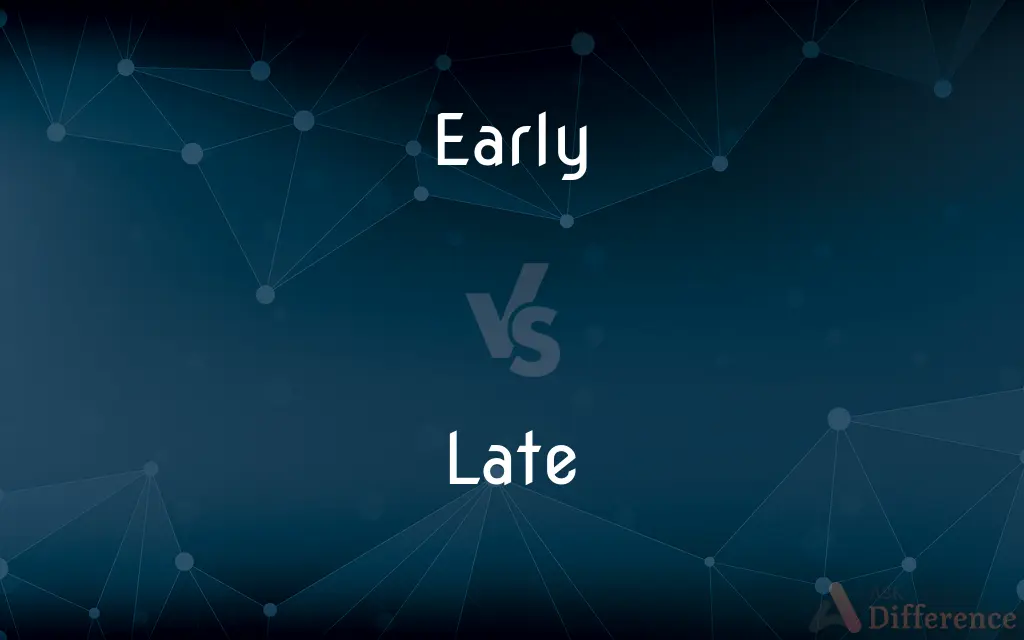Early vs. Late — What's the Difference?
By Fiza Rafique & Urooj Arif — Updated on April 18, 2024
Early refers to something happening or done before the expected or usual time, while late means occurring after the expected or planned time.

Difference Between Early and Late
Table of Contents
ADVERTISEMENT
Key Differences
In biology, early development stages of organisms are crucial for proper growth and development, whereas later stages often involve maturation and aging processes, each critical but distinct in their biological implications.
In the context of historical events, early periods refer to the initial phases or ancient times, focusing on the foundation or origins. Conversely, later periods denote more recent times or the evolution of earlier circumstances, highlighting changes and developments over time.
In technology, adopting tools or systems early can lead to gaining a competitive edge, leveraging new innovations ahead of others. On the contrary, late adoption might involve more skepticism but can benefit from the refinement of earlier shortcomings in technology.
Financially, paying early often results in benefits like discounts or good credit standings, while late payments can incur penalties, interest, or damage to credit reputation, showing the financial impact of timing.
Comparison Chart
Definition
Occurring before the expected time
Occurring after the expected time
ADVERTISEMENT
Implications
Generally positive (e.g., punctuality)
Generally negative (e.g., tardiness)
Biological Relevance
Related to development stages
Related to maturation and aging
Historical Context
Pertains to beginnings or ancient times
Pertains to more recent periods or developments
Technological Impact
Advantageous for early adopters
Potentially more cautious but refined
Compare with Definitions
Early
Pertaining to near the start.
The early chapters of the book set the scene.
Late
Pertaining to the final phases.
Late-stage investments can be risky.
Early
In advance of the usual.
He made an early retirement from his career.
Late
After the usual or expected time.
A late dinner can disrupt your sleep.
Early
Occurring before the expected time.
She arrived early at the meeting.
Late
Not occurring until after the expected time.
He apologized for running late.
Early
Relating to the beginning phase.
The early symptoms of the disease are mild.
Late
Deceased (used posthumously).
The late artist's work gained value.
Early
Denoting the first part.
Early morning is his most productive time.
Late
Existing or happening near the end.
Her late career was the most successful.
Early
Of or occurring near the beginning of a given series, period of time, or course of events
In the early morning.
Scored two runs in the early innings.
Late
Coming, occurring, continuing, or remaining after the correct, usual, or expected time; delayed
A late breakfast.
A late meeting.
Early
Of or belonging to a previous or remote period of time
The early inhabitants of the British Isles.
Late
Occurring at an advanced hour, especially well into the evening or night
A late movie on television.
The late flight to Denver.
Early
Of or belonging to an initial stage of development
An early form of life.
An early computer.
Late
Of or toward the end or more advanced part, as of a period or stage
The late 19th century.
A later symptom of the disease.
Early
Occurring, developing, or appearing before the expected or usual time
An early spring.
An early retirement.
Late
Having begun or occurred just previous to the present time; recent
A late development.
Early
Maturing or developing relatively soon
An early variety of tomato.
Late
Contemporary; up-to-date
The latest fashion.
Early
Occurring in the near future
Hoped for an early end to the negotiations.
Late
Having recently occupied a position or place
The company's late president gave the address.
Early
Near the beginning of a given series, period of time, or course of events
Departed early in the day.
Scored important victories early in the campaign.
Late
After the expected, usual, or proper time
A train that arrived late.
Woke late and had to skip breakfast.
Early
At or near the beginning of the morning
She never used to get up so early.
Late
At or until an advanced hour
Talked late into the evening.
Early
At or during a remote or initial period
Decided very early to go into medicine.
Late
At or into an advanced period or stage
A project undertaken late in her career.
Early
Before the expected or usual time
Arrived at the meeting a few minutes early.
Late
Recently
As late as last week he was still in town.
Early
Soon in relation to others of its kind
A rose that was cultivated to bloom early.
Late
Near the end of a period of time.
It was late in the evening when we finally arrived.
Early
Arriving a time before expected; sooner than on time.
You're early today! I don't usually see you before nine o'clock.
The early guests sipped their punch and avoided each other's eyes.
Late
Specifically, near the end of the day.
It was getting late and I was tired.
Early
Near the start or beginning.
The play "Two Gentlemen of Verona" is one of Shakespeare's early works.
Early results showed their winning 245 out of 300 seats in parliament. The main opponent locked up only 31 seats.
Late
Associated with the end of a period.
Late Latin is less fully inflected than classical Latin.
Early
Near the start of the day.
It's too early for this sort of thing. I'm not awake yet.
Late
Not arriving until after an expected time.
Even though we drove as fast as we could, we were still late.
Panos was so late that he arrived at the meeting after Antonio, who had the excuse of being in hospital for most of the night.
Early
Having begun to occur; in its early stages.
Early cancer
Late
Not having had an expected menstrual period.
I'm late, honey. Could you buy a test?
Early
(astronomy) Of a star or class of stars, hotter than the sun.
Late
Existing or holding some position not long ago, but not now; departed, or gone out of office.
The late bishop of London
The late administration
Early
(informal) A shift (scheduled work period) that takes place early in the day.
Late
Recent — relative to the noun it modifies.
Early
At a time before expected; sooner than usual.
We finished the project an hour sooner than scheduled, so we left early.
Late
(astronomy) Of a star or class of stars, cooler than the sun.
Early
Soon; in good time; seasonably.
Late
(informal) A shift (scheduled work period) that takes place late in the day or at night.
Early
Soon; in good season; seasonably; betimes; as, come early.
Those that me early shall find me.
You must wake and call me early.
Late
Formerly, especially in the context of service in a military unit.
Colonel Easterwood, late of the 34th Carbines, was a guest at the dinner party.
The Hendersons will all be there / Late of Pablo Fanque's Fair / What a scene!
Early
In advance of the usual or appointed time; in good season; prior in time; among or near the first; - opposed to late; as, the early bird; an early spring; early fruit.
Early and provident fear is the mother of safety.
The doorsteps and threshold with the early grass springing up about them.
Late
Not long ago; just now.
Early
Coming in the first part of a period of time, or among the first of successive acts, events, etc.
Seen in life's early morning sky.
The forms of its earlier manhood.
The earliest poem he composed was in his seventeenth summer.
Late
Coming after the time when due, or after the usual or proper time; not early; slow; tardy; long delayed; as, a late spring.
Early
Being or occurring at an early stage of development;
In an early stage
Early forms of life
Early man
An early computer
The late phase of feudalism
A later symptom of the disease
Later medical science could have saved the child
Late
Far advanced toward the end or close; as, a late hour of the day; a late period of life.
Early
Of the distant past;
The early inhabitants of Europe
Former generations
In other times
Late
Existing or holding some position not long ago, but not now; recently deceased, departed, or gone out of office; as, the late bishop of London; the late administration.
Early
Very young;
At an early age
Late
Not long past; happening not long ago; recent; as, the late rains; we have received late intelligence.
Early
Of an early stage in the development of a language or literature;
The Early Hebrew alphabetical script is that used mainly from the 11th to the 6th centuries B.C.
Early Modern English is represented in documents printed from 1476 to 1700
Middle English is the English language from about 1100 to 1500
Middle Gaelic
Late
Continuing or doing until an advanced hour of the night; as, late revels; a late watcher.
Early
Expected in the near future;
Look for an early end to the negotiations
Late
After the usual or proper time, or the time appointed; after delay; as, he arrived late; - opposed to early.
Early
During an early stage;
Early on in her career
Late
Not long ago; lately.
Early
Before the usual time or the time expected;
She graduated early
The house was completed ahead of time
Late
Far in the night, day, week, or other particular period; as, to lie abed late; to sit up late at night.
Early
In good time;
He awoke betimes that morning
Late
Being or occurring at an advanced period of time or after a usual or expected time;
Late evening
Late 18th century
A late movie
Took a late flight
Had a late breakfast
In the middle years
In his middle thirties
Late
After the expected or usual time; delayed;
A belated birthday card
I'm late for the plane
The train is late
Tardy children are sent to the principal
Always tardy in making dental appointments
Late
Of the immediate past or just previous to the present time;
A late development
Their late quarrel
His recent trip to Africa
In recent months
A recent issue of the journal
Late
Having died recently;
Her late husband
Late
At or toward an end or late period or stage of development;
The late phase of feudalism
A later symptom of the disease
Later medical science could have saved the child
Late
(used especially of persons) of the immediate past;
The former president
Our late President is still very active
The previous occupant of the White House
Late
To an advanced time;
Deep into the night
Talked late into the evening
Late
At an advanced age or stage;
She married late
Undertook the project late in her career
Late
In the recent past;
He was in Paris recently
Lately the rules have been enforced
As late as yesterday she was fine
Feeling better of late
The spelling was first affected, but latterly the meaning also
Common Curiosities
Can "late" have positive implications?
Yes, in some contexts, like "late bloomer", it signifies positive development later in life.
Why is "early adoption" important in business?
It can provide a competitive edge by utilizing new innovations sooner.
What does "early bird" mean?
Refers to someone who wakes up very early or arrives before others.
What does "late" imply in historical studies?
It refers to recent or modern periods as opposed to ancient or early history.
How does the term "late" relate to deceased individuals?
It is used to refer to someone who has passed away.
How can arriving early benefit you?
It can demonstrate reliability and provide extra time for preparation.
How does being late affect one's financial credit?
Late payments can lead to penalties and negatively impact credit scores.
Can being early ever be a disadvantage?
Yes, being too early might mean waiting unnecessarily or acting on incomplete information.
What are the consequences of being late?
It can reflect poorly on one's reliability and disrupt schedules.
What is meant by "early retirement"?
Retiring before the traditional age, often due to financial readiness or personal choice.
What does "early riser" imply about a person?
That they habitually wake up early in the morning.
Is there a cultural significance to being early or late?
Yes, cultural norms around timeliness can vary significantly, affecting social and business interactions.
What is an "early warning"?
A notification given in advance to prevent or mitigate risks.
How does the biological concept of early and late apply to human development?
Early stages involve initial growth and development, while later stages include aging and maturity.
Share Your Discovery

Previous Comparison
Microorganism vs. Pathogen
Next Comparison
Strategic vs. TacticalAuthor Spotlight
Written by
Fiza RafiqueFiza Rafique is a skilled content writer at AskDifference.com, where she meticulously refines and enhances written pieces. Drawing from her vast editorial expertise, Fiza ensures clarity, accuracy, and precision in every article. Passionate about language, she continually seeks to elevate the quality of content for readers worldwide.
Co-written by
Urooj ArifUrooj is a skilled content writer at Ask Difference, known for her exceptional ability to simplify complex topics into engaging and informative content. With a passion for research and a flair for clear, concise writing, she consistently delivers articles that resonate with our diverse audience.














































